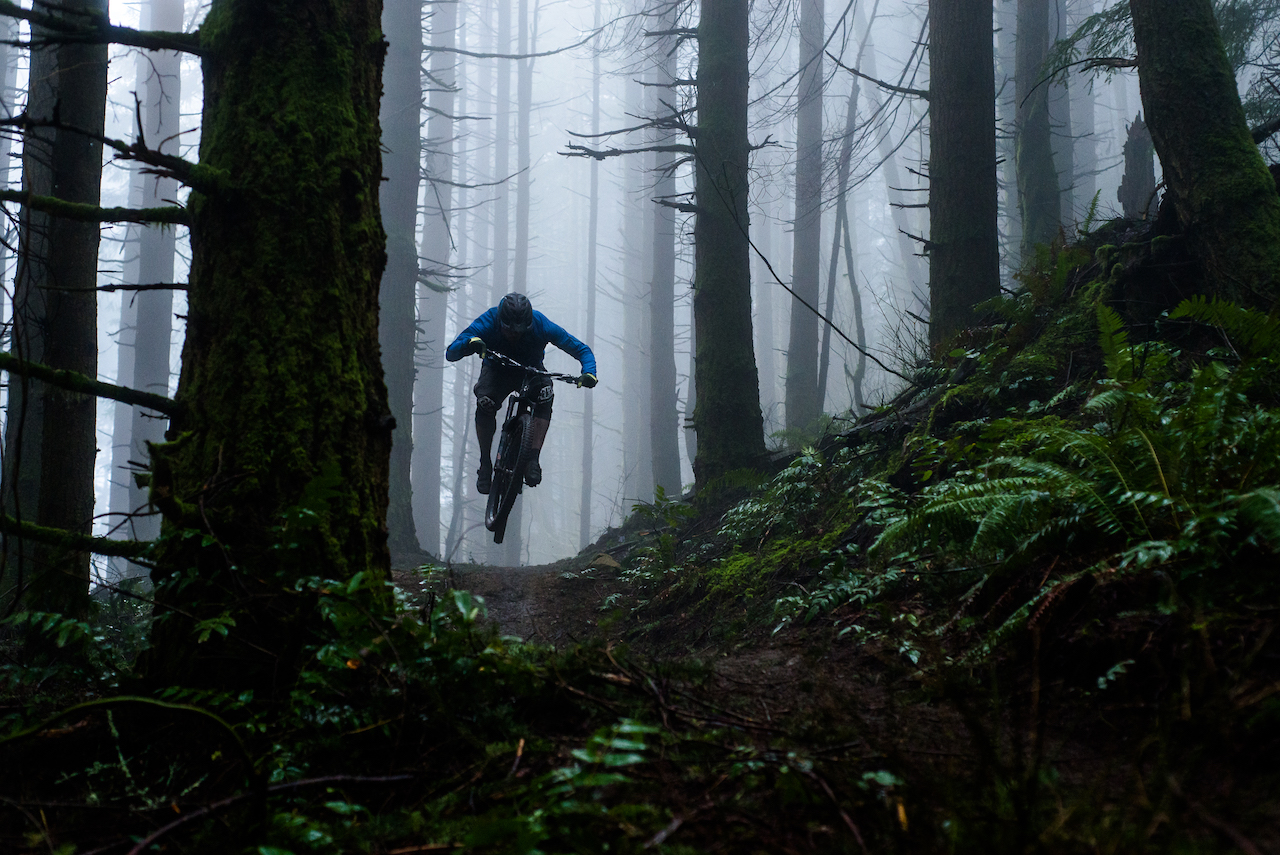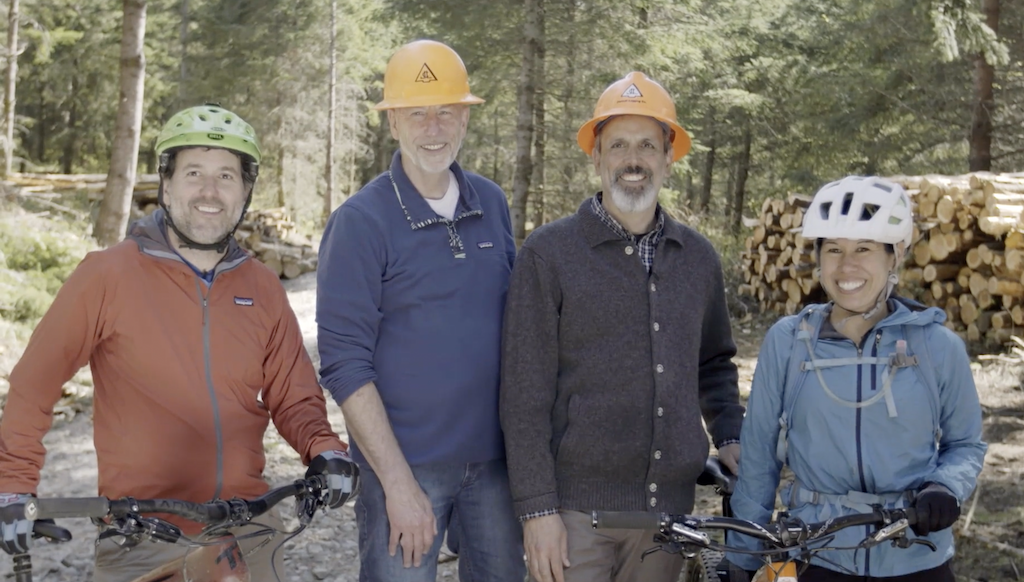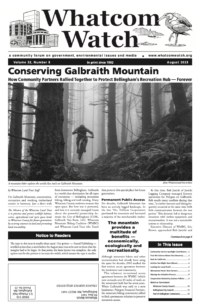by Whatcom Land Trust Staff

A mountain biker explores the world-class trails on Galbraith Mountain.
photo: Whatcom Land Trust archives
On Galbraith Mountain, conservation, recreation and working timberland coexist in harmony. Just a short walk from downtown Bellingham, Galbraith is a world-class destination for all types of recreation — including mountain biking, hiking and trail running. Many Whatcom County residents treasure this open space. But how was it protected, and how is it currently managed? Learn about the powerful partnership between the City of Bellingham (COB), Galbraith Tree Farm, LLC, Whatcom Mountain Biking Coalition (WMBC) and Whatcom Land Trust (the Trust) that protects this special place for future generations.
Permanent Public Access
For decades, Galbraith Mountain has been an actively logged landscape. In the late ‘90s, Trillium Corporation purchased the mountain and harvested a majority of the merchantable timber. Although mountain bikers and other recreationalists had already been using the space for decades, 2002 marked the first written access agreement between the landowner and community.
This voluntary recreational access agreement between the WMBC (which now stewards over 65 miles of trails on the mountain) held fast for seven years. When Galbraith was sold to a new landowner, Polygon Financial Partners, the mountain biking community rallied to find a permanent solution to preserve recreation access.
At that time, Rob Janicki of Janicki Logging Company managed forestry operations for Polygon on Galbraith. Rob recalls many conflicts during that time, “as timber harvests and biking frequently occurred at the same time with little communication between the two parties.” This dynamic led to dangerous situations with timber equipment and recreationalists. It was not a sustainable system or relationship.
Executive Director of WMBC, Eric Brown, approached Rob Janicki and jokingly suggested that Janicki purchase Galbraith from Polygon. Taking the idea to heart, Janicki purchased the mountain for $8 million in 2017, creating Galbraith Tree Farm, LLC. The Tree Farm would operate with dual goals — maintaining recreation access and continuing timber production in a safe and collaborative environment.

Representatives from WMBC, the Trust, Galbraith Tree Farm, and SuperFeet gather to celebrate the community partnerships that made Galbraith’s conservation possible.
photo: The Conservation Alliance.
Protecting Galbraith From Development
In addition to being a recreation hub, Galbraith serves as a valuable open space for habitat and wildlife corridors. After Janicki’s purchase, Whatcom Land Trust — which works to permanently protect and restore special places in the county for future generations — worked with COB to facilitate negotiations and determine the best way to prohibit development and protect recreation access.
Rand Jack, a founding Board member of the Trust, advocated for the adoption of two easements: 1) a conservation easement held by The Trust to prohibit development, and 2) a recreation easement held by COB protecting recreational use.
A conservation easement is a permanent legal agreement that limits land use and development to meet and maintain conservation goals unique to each property. Rand stated, “Once something is built up with houses, it’s almost impossible for that place to return to its natural state,” so the prohibition of development was key in achieving conservation goals.
Rich Bowers, Executive Director of The Trust during negotiations, said it was “the first time Whatcom Land Trust ever took on a project that was first and foremost a recreation project … . We were going to make sure it was conserved and wasn’t developed, but that recreation still remained a priority.” Whatcom Land Trust frequently works with the city, county and community partners to conserve land forever — resulting in the protection of important places like Galbraith.
In the summer of 2018, COB, The Trust, and the Tree Farm legally secured permanent public access of 65 miles of trails on Galbraith and permanently protected over 2,000 acres of the mountain from development. To so many people in the community, this was a dream of more than 20 years in the making.
The groundwork was laid, but uncertainty remained. How would the partners work together to promote recreation, conservation and forestry in one place?
Building a Community Partnership
According to every partner involved in protecting and managing Galbraith, the answer is relationship-building, communication, mutual respect and community support.
Rob Janicki credits his nephew for envisioning a key communication tool between foresters and the recreation community — a Facebook page to notify the public of all harvesting activities on the mountain, effectively increasing safety and trust between these groups.
Additionally, Eric Brown said the Tree Farm proactively communicates with WMBC to inform them of harvesting plans and timelines. After logging is finished, they immediately contact WMBC so they can rebuild trails impacted by timber harvesting.
Although it can be difficult for Galbraith recreationalists to accept changes to their favorite trails, Eric views this as a great opportunity to keep reinventing the mountain. “When the trees get cleared around a trail, WMBC gets right to work turning the old trail into a cooler place with new and updated features,” said Eric. For example, after the bottom of the south side was logged in 2015, WMBC redesigned the trail system to create a “beginner zone.” This zone of safe entry-level trails has opened up mountain biking access for new riders and youth organizations like the Vamos Outdoors Project. This constant innovation and dedication to accessible trails contributes to Galbraith’s reputation as a world-class mountain biking destination.
Community Stewardship of Galbraith
Eric Brown has noticed the immense care recreationalists have for Galbraith — and it shows through their work stewarding trails. “It’s a community effort to keep the property clean, healthy and safe,” said Eric. “Kids often ride the mountain by themselves because parents feel secure. It’s a place where people feel safe because there are enough people up there that if something were to happen, there is always help available.”
The WMBC has become “a force of nature” according to Rand Jack, and is incredibly successful in their management and stewardship of the mountain. Eric said WMBC rarely has to clean up garbage or trespass individuals violating the rules of the mountain. “A lot of people have been riding up on Galbraith for decades, and, when something seems off, they are very protective.” The culture of care and stewardship of this special place connects the entire community.
Forestry on Galbraith
Janicki Logging Company also plays an important role in the stewardship of the mountain, guided by Rob’s passion for sustainable forestry.
Annually, the Tree Farm generates enough wood to build over 100 homes — and most of the harvested products are used locally in Washington state. The Tree Farm also sustains local forestry jobs, and hopes to connect with local educators to create hands-on learning experiences.
Moving Forward
Galbraith Mountain has become a permanent fixture in Bellingham. The mountain provides a multitude of benefits — economically, ecologically and recreationally.
Chris Moench, a past Board President of Whatcom Land Trust, walks up on the mountain regularly. He says there’s a lot of wildlife that enjoy the habitat on the mountain and the diversity of the wildlife changes depending on the current age of the forest. Galbraith Mountain may change from year to year, but, due to the collaborative work of so many groups, residents will enjoy recreation and open space on the mountain for generations to come.
_____________________
The Mission of the Whatcom Land Trust is to preserve and protect wildlife habitat, scenic, agricultural and open space lands in Whatcom County for future generations by securing interests in land and promoting land stewardship.




























